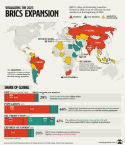
Germany publishes strategy "against" BRICS. Some interesting insights regardless:
Berlin debates how to deal with BRICS’ increase in influence. The group admits six new members, embeds itself intensively in the Middel East and weakens the position of the US dollar.
The threat of apprehending Russia’s President Vladimir Putin on his way to South Africa was aimed at stirring up tensions within the BRICS group. Just before the summit and fully in line with the strategy of division, German Foreign Minister Annalena Baerbock declared that every country must keep asking itself, “which partnership best suits its own values and interests.” It would not help to coordinate internally with Moscow, if Russia, “at the same time, literally bombs the grain deal, and countries such as Brazil or South Africa also suffer as a result.[1] The strategy did not work.
The New Development Bank (NDB), founded by BRICS in 2014 as an alternative to the World Bank, and which began work in 2015, is also transitioning away from the US dollar. Over the past few years, the NDB has accepted Egypt, the UAE, and Bangladesh. Uruguay is in the process of joining.
The portion of NDB activities that are not being transacted in US dollars is already at 22 percent, the major portion of which are loans denominated in yuan. According to NDB President Dilma Rousseff, in the period from 2022 – 2026, that amount should be increased to 30%.[10] This will include loans in Brazilian reais, South African rand and Indian rupees.
According to Berlin, continuing the attempt to divide BRICS will hardly be successful. Already before the BRICS summit, SWP was recommending that it would be better to adopt a sort of strategy of inclusion. This could possibly consist of opening major events, such as the Munich security Conference, more to issues pertaining to the Global South.[11]
The first declaration made by Germany’s Foreign Minister Annalena Baerbock after the BRICS summit in Johannesburg contained elements of this "strategy of inclusion". Baerbock announced that cooperation would continue, not only with the BRICS countries – with the exception of Russia and to a limited extent with China – but also with the new members. “We want to cooperate with the countries around the world, of course also with those who have views that differ from ours.”[12] It is unlikely that BRICS members would forego genuine independence for such offers of integration.

